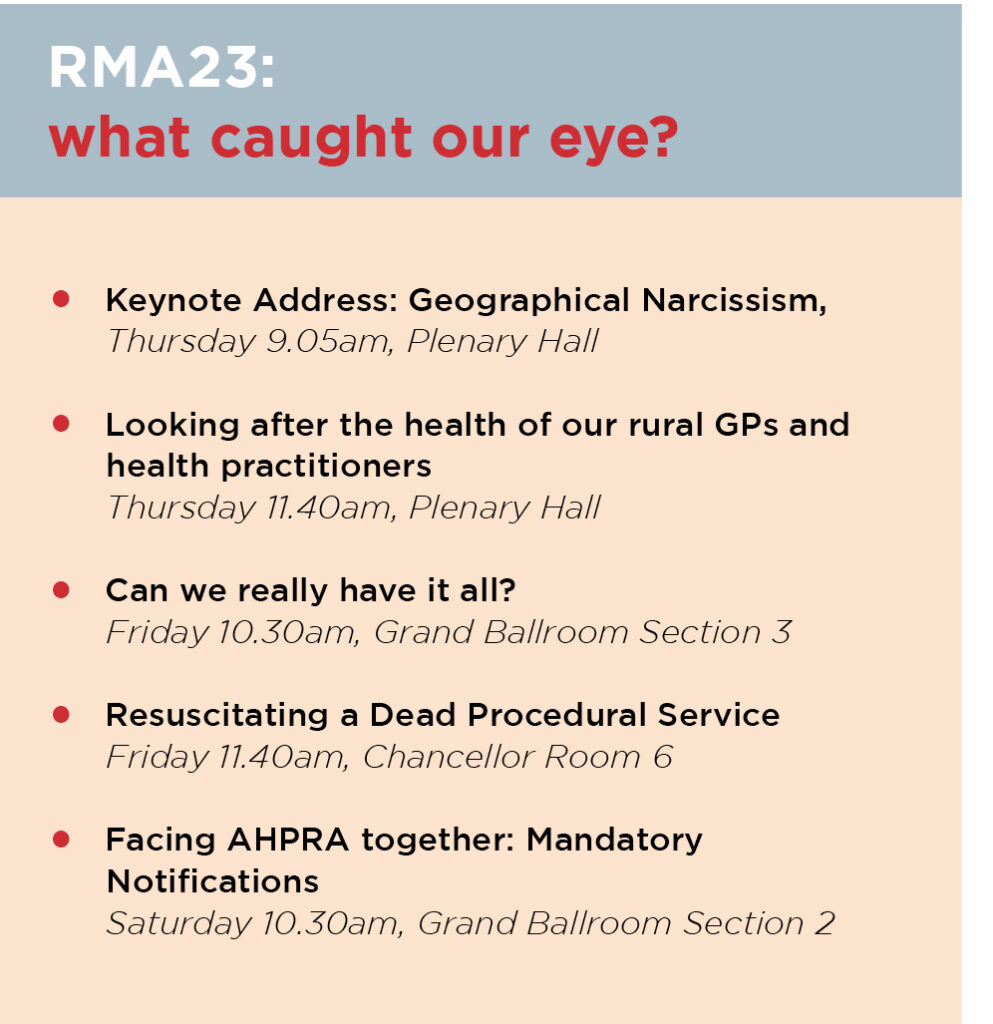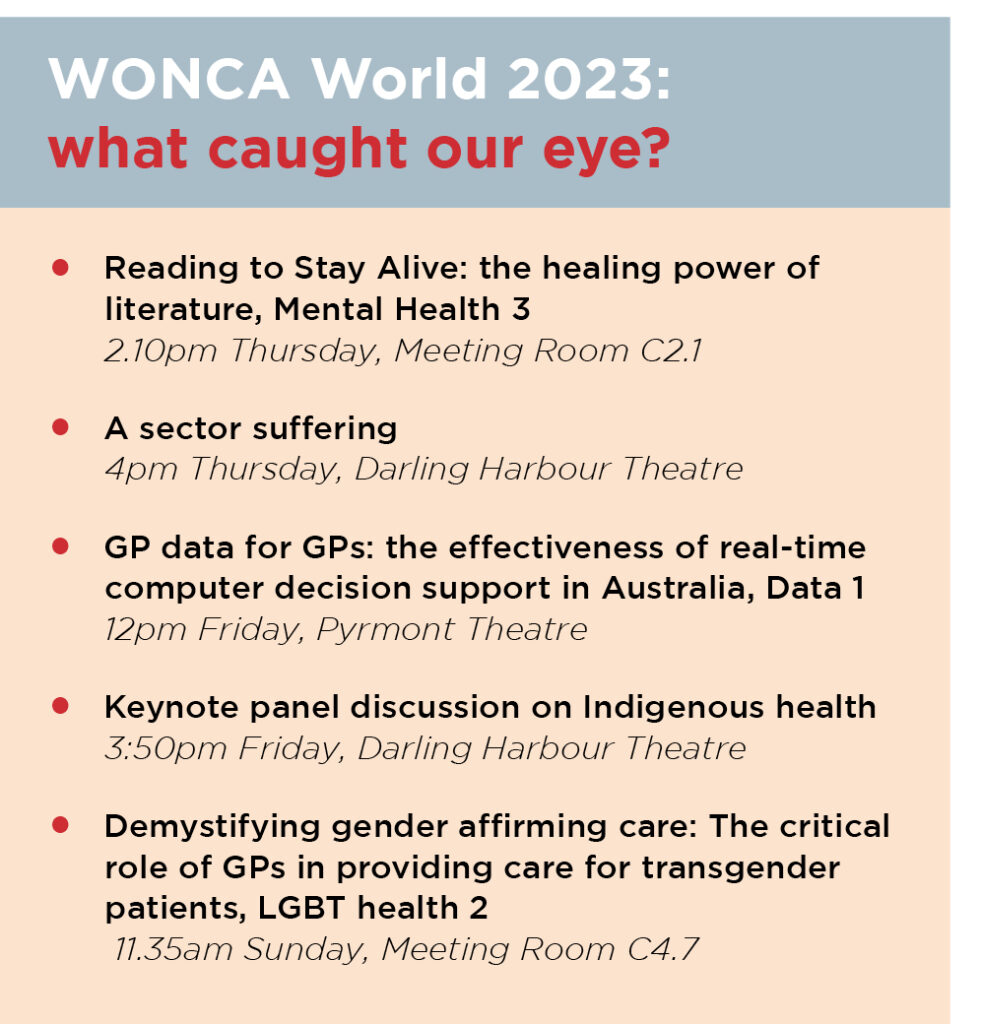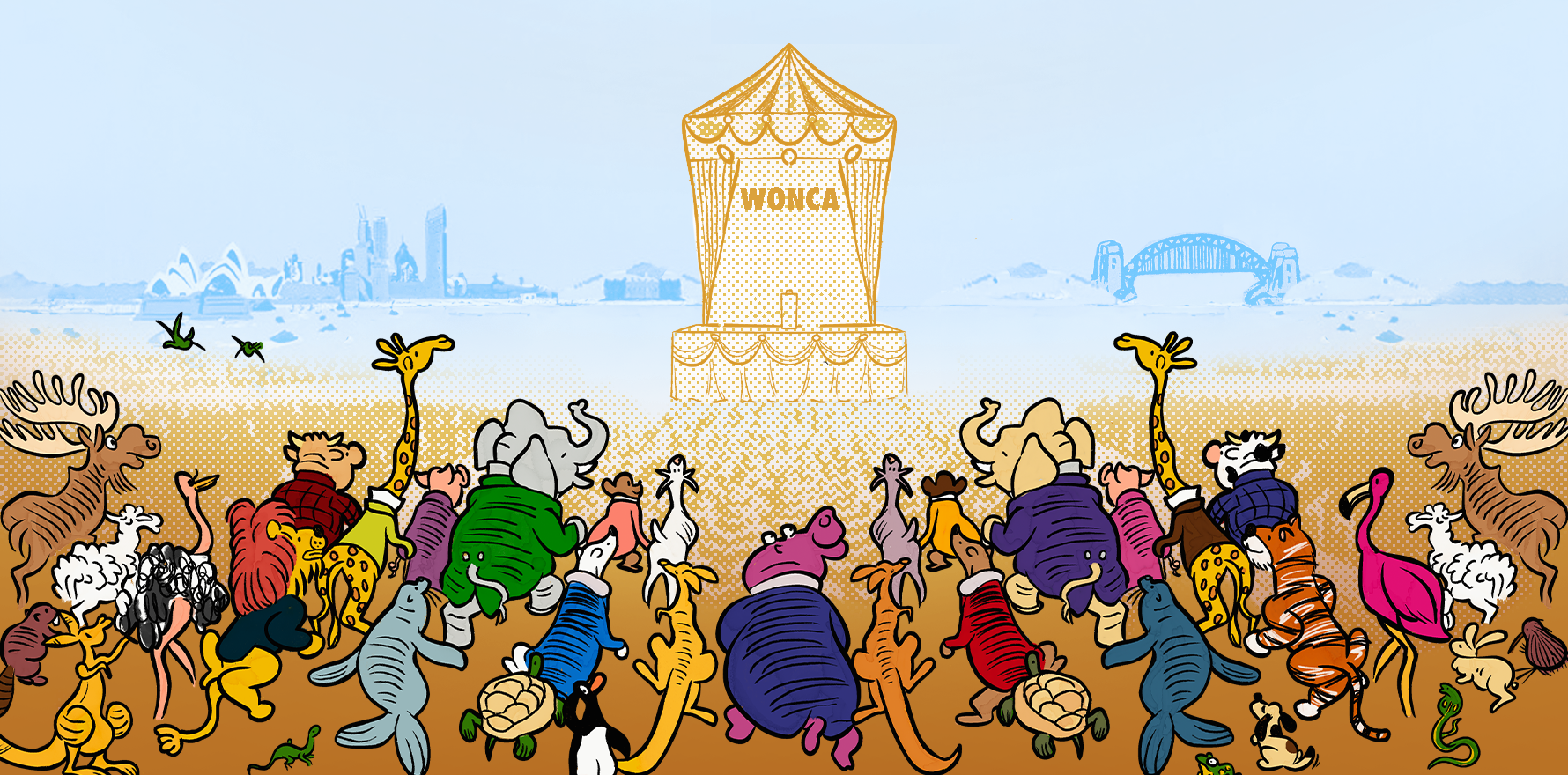Two weeks, two conferences, hundreds of sessions to choose from. Start planning now …
The Rural Medicine Australia conference and the world family doctor conference WONCA fall within a week of each other this month – making for a very spooky Halloween conference season if you’re scared about health inequality.
RMA23 is coming up first, at the Hotel Grand Chancellor in Hobart from 18-21 October.
It’s an official pre-WONCA event, meaning that it does have more of a focus on international rural contexts than previous years, but is hosted by the Rural Doctor’s Association of Australia and ACRRM rather than the RACGP.
The conference proper won’t kick off until the morning of Thursday 19 October, with an opening plenary from Dr Norman Swan followed by a keynote on geographic narcissism by Professor Malin Fors [Keynote Address: Geographical Narcissism 9.05am, Plenary Hall].
“I’m really looking forward to hearing Dr Fors’ talk on geographical narcissism – also noting that she is coming in from Norway – and I’m hoping that she might talk about [her research on what she calls] the ‘potato ethics’ of rural practice,” ACRRM president Dr Dan Halliday told TMR.
“That could be quite an interesting and insightful talk.”
According to outgoing RDAA president Dr Megan Belot, Friday will be the day to catch, with hot sessions including a panel discussion on work-life balance [Can we really have it all? 10.30am, Grand Ballroom Section 3], a talk from rural generalist Dr Angus Brown on how he resuscitated surgical procedural services in two regional towns [Resuscitating a Dead Procedural Service 11.40am, Chancellor Room 6] and a presentation on a new, validated clinical courage questionnaire [Clinical Courage: lived experience rural doctors 11.40am, Grand Ballroom Section 2].
Another session to catch will be the panel on Indigenous health [Indigenous Health Panel, 9.05am, Plenary Hall], which will be taking place less than a week after the referendum on the Aboriginal and Torres Strait Islander voice to parliament.
For those looking to use their time efficiently, the Presidents’ Breakfast on Friday morning will be the place to catch all the big hitters in terms of the colleges [Presidents’ Breakfast: Rural Workforce – are we there yet?, 7am, separately ticketed].
The breakfast features a Q&A style panel discussion on rural workforce between presidents of the RDAA, ACRRM, RACGP, the Council of Presidents of Medical Colleges and Australian Indigenous Doctors’ Association as well as the National Rural Health Commissioner and a Department of Health representative.
Sessions on the final day, Saturday 21 October, are set to wrap up by around 2pm.

Located at Sydney’s International Conference Centre, WONCA won’t officially open its doors until Thursday 26 October.
There are, however, a number of pre-conference workshops happening on the Wednesday.
Workshop 12, The Entrepreneurial GP [11am, Meeting Room C4.11], caught the attention of Sydney GP Dr Brad McKay.
“Long gone are the days of general practitioners earning a reasonable income doing general practice alone,” he told TMR.
“We all need a side hustle if we want to be able to pay our mortgage.”
To that end, Dr McKay also highlighted the all-day workshop on point-of-care ultrasound [Introduction to Point-of-Care Ultrasound Workshop 9am, Meeting Room C4.8] as potentially being of interest.
While there are no Medicare rebates for GPs doing ultrasounds, he said, the fact that patients are getting used to paying out-of-pocket for healthcare opens up its potential as a side hustle.
The conference officially opens on Thursday morning, with a keynote address from outgoing WONCA president Dr Anna Stavdal [Healthcare In Uncertain Times 9.20am, Darling Harbour Theatre].
Dr Stavdal, a family medicine specialist from Norway, came into the president role in November 2021 and will be formally handing over the reigns to president-elect Associate Professor Karen Flegg, an Australian GP.
Regular TMR columnist Associate Professor Louise Stone will be presenting on the role of GPs in caring for survivors of sexual harm at around midday on the opening day, as part of the Ethical Issues 1 concurrent [#MeToo in Medicine: the role of GPs caring for survivors of sexual harm in the medical profession 11.45am, meeting room C4.11].
“The largely hidden iceberg of sexual harm impacts much of our work whether we recognise it or not,” Professor Mark Morgan said.
“I am looking forward to learning from the expert.”
Professor Morgan, who is chairing the conference’s scientific committee, also told TMR he was looking forward to Associate Professor Joachim Sturmberg’s presentation, Solving ‘Wicked Problems’ – Conceptual and Research Approaches [Complexities in health 6 2.10pm Thursday, meeting room E5.1], which is set to dive into the research methodologies best suited to answering “wicked questions”.
“Wicked problems are everywhere in primary care,” Professor Morgan said.
“I am looking forward to gaining some insights in different ways to approach them.”
The most anticipated Thursday session, multiple doctors told TMR, will likely be the 4pm keynote address from British GP Professor Trish Greenhalgh [A sector suffering, Darling Harbour Theatre]
It’s set to focus on the idea that primary care, both in Australia and internationally, is in trouble.
“At an individual level, suffering occurs when a core aspect of someone’s identity or existence is threatened,” the session description reads.
“It results particularly when we cannot control actions that define our view of ourself.
“It is characterised by loss – of function, of autonomy, of valued relationships and of sense of self.”
Sydney GP Dr Tim Senior told TMR that Professor Greenhalgh is “always worth listening to”, describing her as a “hero of general practice”.
“She will be familiar to many GPs as the author of How to Read a Paper, a small bible of evidence-based medicine,” he said.
“However, she’s also written about narrative-based medicine, about rhetoric in health policy, done ethnographic studies of the use of computer templates and discussed the social context of implementing e-health.”
Dr Senior himself, who recently won a Churchill Fellowship, will be facilitating a keynote panel discussion on Indigenous health on the Friday, [3.50pm, Darling Harbour Theatre].
“We’ll all learn from the common ground in Indigenous health in different settler-coloniser countries, and the ways we can all respond to the challenges of health equity and increasing complexity,” he told TMR.
There are around 28 different concurrent session streams to choose from each day, running the gamut from topics like family violence to rural practice and LGBTQIA+ health.
Two that caught Dr Senior’s eye were the streams on the environment and complexity in health.
Environment 4 [10.35am Saturday, Meeting Room E5.9], for instance, will see presentations on climate change in relation to youth mental health and lessons from the 2022 Lismore floods.
“The keynote on our environmental impacts, from Prof Enrique Falceto de Barros and Dr Maria Neira [One minute for the planet, 8.55am Saturday, Darling Harbour Theatre], will be really important as we experience a very hot spring and head into possibly another extraordinary bushfire season, with profound impacts for us and our patients,” Dr Senior said.
He’s also looking to catch Professor Iona Heath’s closing keynote, Remembering what we know [3.45pm Sunday, Darling Harbour Theatre].
“Professor Heath writes like a dream (every GP should read The Mystery of General Practice) and so her address at the end of WONCA, reminding us once again of the core values of our speciality, will be memorable,” Dr Senior said.
On the topic of reading, TMR contributor Dr Edwin Kruys said he was keen to get along to Reading to Stay Alive: the healing power of literature [2.10pm Thursday, Meeting Room C2.1], part of the Mental Health 3 stream.
The session, delivered by University of Liverpool researcher Emeritus Professor Christopher Dowrick, will involve a case study of a vulnerable patient during the covid lockdown linked with literary representations of suicide throughout Leo Tolstoy’s Anna Karenina.
“Literature often provides valuable learnings for clinicians and I hope to take away some inspiration for fresh approaches in challenging clinical situations,” Dr Kruys said.
Dr Kruys, who has a special interest in mental health, was also keen for Professor Jane Gunn’s talk during the Friday morning mental health concurrent session looking back at 20 years of the DIAMOND study [20 years of Diagnosis, Management and Outcomes of Depression in Primary Care (diamond) study 10.35am, Darling Harbour Theatre].
“I really like Jane’s whole-person approach to mental health and I’m interested to hear about the findings of the long-term study,” he said.
“There is so much we can offer as generalists when supporting people living with a mental illness as we’re able to provide holistic body and mind care – something that’s more needed than ever before.”

This article was updated 6/10/23 with additional comment from Dr Halliday and Professor Morgan.





